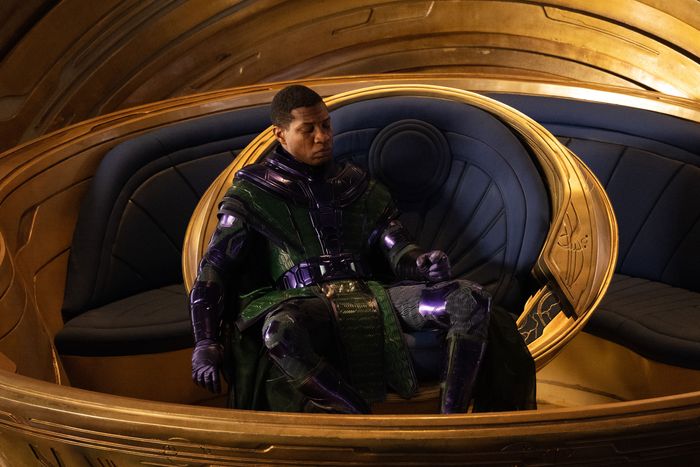
Ant-Man and the Wasp: Quantumania kicks off phase five of the Marvel Cinematic Universe, further setting up the stakes of the multiverse saga and the threat of the new big bad: Kang the Conqueror. Those stakes are meant to become all the clearer in not one, but two credits scenes that are essential for what lies ahead, as all roads lead to Avengers: Secret Wars.
.
The Mid-Credits Scene: “All of Us”
Enter the three central variants of Kang (all of whom are played by Jonathan Majors) as they discuss the death, as far as they know, of “the exiled one” — Kang the Conqueror — who is (spoilers ahead!) defeated in the film by Ant-Man and the Wasp. The three variants, pulled from the pages of the comic books, are Immortus, the blue-skinned and robed elder of the three; Rama-Tut, the pharaoh who established an empire in ancient Egypt; and a silver cyborg version who appears be a new take on the Scarlet Centurion. Together, they have plans for what they perceive to be the growing problem of the Avengers. Immortus, we learn, has called together all of the Kang variants for the beginning of a multiversal war.
The scene then cuts to thousands of Kang variants, each sporting slightly different looks, some of an alien species, cheering in a giant amphitheater as more variants are teleported in to join them. The histories of these characters are vast, complicated, and full of retcons and contradictions. But we’ll keep it simple:
➼ In the comics, Rama-Tut was the first iteration of Kang, appeareing back in Fantastic Four No. 19 (1963), when things were simple enough. A man from the future, known as Nathanial Richards, traveled back in time to ancient Egypt, conquered it, and made himself pharaoh.
➼ The Scarlet Centurion, who first appeared in Avengers Annual No. 2 (1968), is a version of Kang who, after meeting Doctor Doom and believing him to be his ancestor, crafts a suit of armor and pits the Avengers against an alternate version of themselves, hoping to wipe both out and stake his claim to two realities.
➼ Finally, Immortus, the Master of Time, who appeared in Avengers No. 10 (1964), is a more benevolent version of Kang who pruned dangerous alternate timelines from existence, very similar to the role of He Who Remains in the series, Loki. Deceitful, though not necessarily evil, Immortus worked to keep the multiverse from falling into the chaos that Kang desired.
➼ The entire gathering of Kang variants is known as the Council of Kangs, and they appeared in Avengers No. 267 in 1986. Led by Prime Kang, the council was part of a ruse by Immortus to wipe out all other Kang variants and ensure that Prime Kang became Immortus, rather than one of the other variants’ future selves. However, it seems the MCU is streamlining the plot a bit, pushing all the variants to work together toward a common goal: the reshaping the multiverse.
.
The Post-Credits Scene: Man Out of Time
The post-credits scene introduces audiences to yet another key incarnation of Kang. In the 1920s, Victor Timely (yes, Majors) instructs an attentive audience on his theory of time and relativity. In the crowd are Loki (Tom Hiddleston) and Mobius (Owen Wilson). Mobius — not Morbius; just want to emphasize that for everyone — says that Timely doesn’t seem at all like the terrifying man described to him (He Who Remains), but Loki assures him that he is. The scene serves to tee up Loki’s second season, which is expected to debut this summer and further explore the consequences of Kang’s machinations throughout the multiverse and takeover of the TVA.
The comics might hold a few clues as to what audiences can expect from the season. Victor Timely debuted in Avengers Annual No. 21 as a version of Kang who traveled back to 1901 and founded a town in Wisconsin called Timely. There, he established Timely Industries, responsible for constructing parts that would eventually lead to the technological advancement of the time machine in the 31st century. Essentially, Timely is Kang’s means to self-fulfillment — he becomes a time traveler because he traveled through time and created the technology that would allow him to do so. But as far as the comics go, Timely isn’t a variant of Kang — he’s a disguise. If this holds true for the MCU, then Timely is in fact the same man as “the exiled one,” simply at a different point in time, rather than from a different universe. The film’s final tag, “Kang Will Return” may suggest as much.

